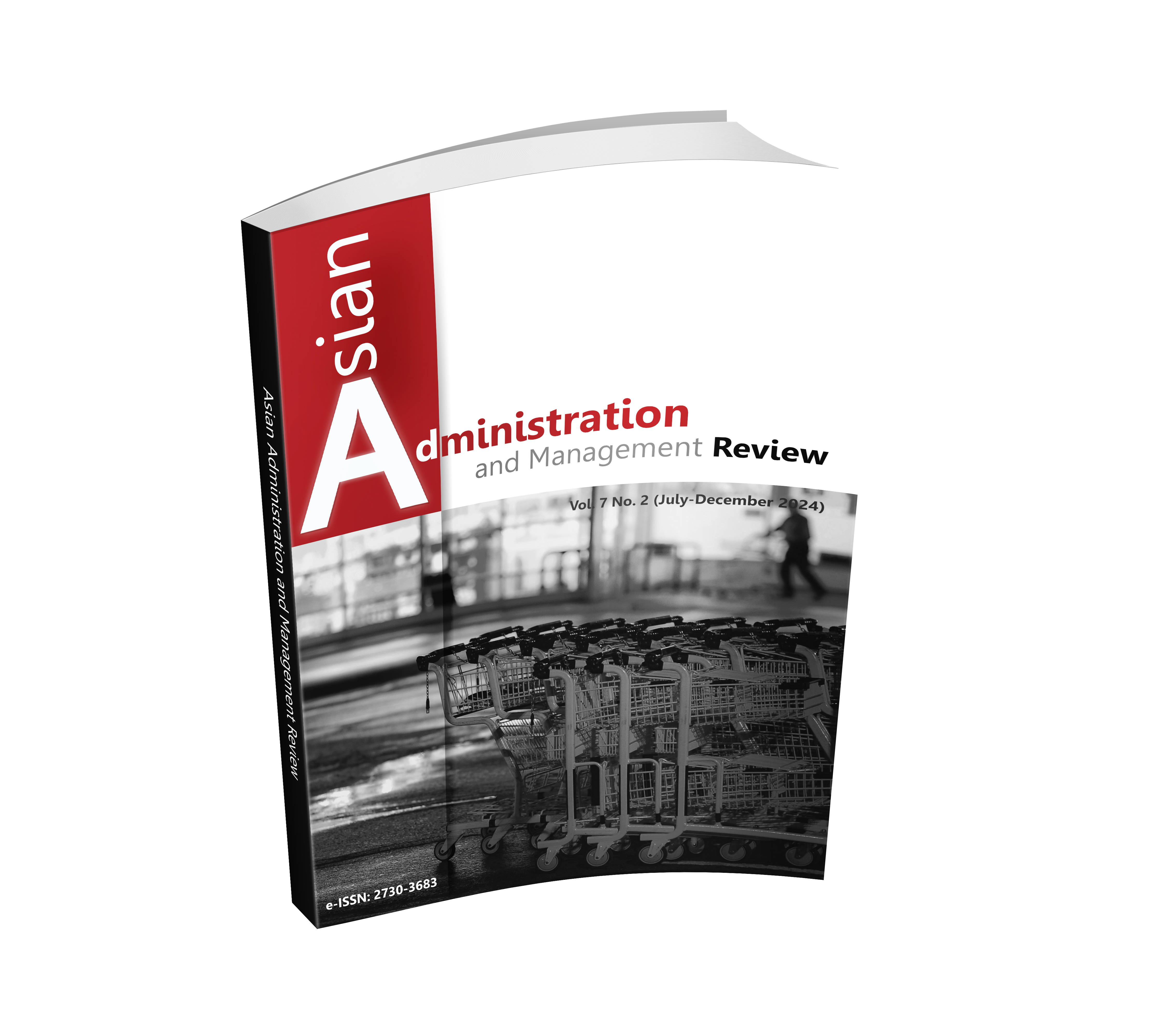CAPITAL POTENTIAL AND ENTREPRENEURIAL POTENTIAL AFFECTING SUSTAINABILITY OF SOCIAL ENTERPRISES BASED ON CULTURAL CAPITAL
DOI:
https://doi.org/10.14456/aamr.2024.19Keywords:
Capital Potential, Entrepreneurial Potential, Sustainability, Social EnterprisesAbstract
This research aimed to study causal variables, capital potential and entrepreneurial potential affecting sustainability of social enterprises based on cultural capital. The study was conducted among members of social enterprises in community social enterprise development model project supported by Art & Culture for Health Literacy, Thai Health Promotion Foundation (THPF) in cooperation with network partners in 4 regions consisting of the project on products from wisdom to wards Mon Pin Community Enterprise, Chiang Mai province, Sawathi Muang Samdee Sustainable Community Enterprise project, Khon Kaen province, Community Social Enterprise Pilot Project in Banglampu, Bangkok and “Songkhla Heritage” Community Enterprise Model Development Project , Songkhla province. The multiple regression analysis results of capital potential showed that cultural capital, human capital, and social capital had statistically significant effects on sustainability of social enterprises. Capital potential was effective to collaboratively predict and describe sustainability of social enterprises by 38.9%. The multiple regression analysis results of entrepreneurial potential indicated that entrepreneurial potential with respect to achievement competencies, planning competencies, and power competencies had statistically significant effects on sustainability of social enterprises. Capital potential was effective to collaboratively predict and describe sustainability of social enterprises by 62.9%.
Downloads
References
Cooper, D., & Schindler, P. (2003). Business Research Methods. 8th ed. Massachusetts: McGraw-Hill Irwin.
Hair, J., Black, W., Babin, B., & Anderson, R. (2010). Multivariate Data Analysis. 7th ed. New York: Pearson Prentice Hall.
Jongsuksomsakul, P. (2019). Communication, Cultural Capital and Social Capital for Sufficient Happiness of People in Community of Koakha, Lampang Province and Inthaburi, Singhburi Province. Journal of Community Development Research (Humanities and Social Sciences), 12(2), 122-134.
Junsong, S., Dockthasong, B., Banchirdrit, S., & Sriharun, B. (2016). The development of social capital to build up a strong community. Journal of Humanities and Social Sciences Mahasarakham University, 35(2), 249-260.
Krejcie, R., & Morgan, D. (1970). Determining Sample Size for Research Activities. Educational and Psychological Measurement, 30, 607-610.
Mankong, A. (2017). The role of cultural capital and the community’s economic development: Case study of community in Ban Toon sub-district, Muang district, Phayao province. Research and Development Journal Loei Rajabhat University, 12(39), 90-100.
Namwong, W. (2021). The mediating effect of entrepreneurship orientation in social capital, dynamic capability to competitive advantage of innovative business and startup in Thailand. Doctor of Philosophy Thesis, Maejo University.
Noonin, S. (2014). Organizational Analysis: Social Enterprise. Journal of Social Sciences Srinakharinwirot University, 17, 358-372.
Pititanakarn, N. (2017). Entrepreneurial characteristics having influence on successful 3-star hotel enterpreneurs in mueang district, Chiang Mai Province. Master of Business Administration Thesis, Maejo University.
Pratumsuwan, K., & Phansiri, P. (2021). Social Enterprise Based on Cultural Capital for Sustainable Development. University of the Thai Chamber of Commerce Humanities and Social Sciences, 41(3), 88-101.
Rovinelli, R., & Hambleton, R. (1977). On the Use of Content Specialists in the Assessment of Criterion-Referenced Test Item Validity. Tijdschrift Voor Onderwijs Research, 2, 49-60.
Satpanit, K., Kattiyawong, T., & Suthibhapha, T. (2020). The Development of the Potential of the Small and Medium Entrepreneurs in the Eastern Border Trading Zone to Increase the Organizational Competitiveness. Rajabhat Rambhai Barni Research Journal, 14(3), 128-135.
Social Enterprise UK. (2011). Fightback Britain: A report on the State of Social Enterprise Survey 2011. London: Social Enterprise UK.
The Royal Society. (2003). Royal Institute Dictionary 1999. Bangkok: Nanmee Books Publishing.
Thienprasert, T. (2017). The role of human capital on economic growth: a comparason of Thailand, Malaysia and Indonesia. Srinakharinwirot Business Journal, 8(1), 27-38.

Downloads
Published
How to Cite
Issue
Section
License
Copyright (c) 2024 Authors

This work is licensed under a Creative Commons Attribution-NonCommercial-NoDerivatives 4.0 International License.











.png)


